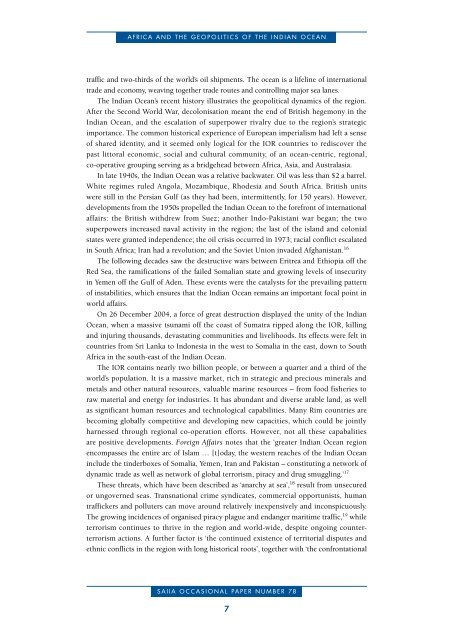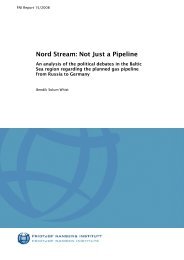Africa and the Geopolitics of the Indian Ocean
Africa and the Geopolitics of the Indian Ocean
Africa and the Geopolitics of the Indian Ocean
Create successful ePaper yourself
Turn your PDF publications into a flip-book with our unique Google optimized e-Paper software.
AfRICA ANd thE gEOPOLItICS Of thE INdIAN OCEAN<br />
traffic <strong>and</strong> two-thirds <strong>of</strong> <strong>the</strong> world’s oil shipments. The ocean is a lifeline <strong>of</strong> international<br />
trade <strong>and</strong> economy, weaving toge<strong>the</strong>r trade routes <strong>and</strong> controlling major sea lanes.<br />
The <strong>Indian</strong> <strong>Ocean</strong>’s recent history illustrates <strong>the</strong> geopolitical dynamics <strong>of</strong> <strong>the</strong> region.<br />
After <strong>the</strong> Second World War, decolonisation meant <strong>the</strong> end <strong>of</strong> British hegemony in <strong>the</strong><br />
<strong>Indian</strong> <strong>Ocean</strong>, <strong>and</strong> <strong>the</strong> escalation <strong>of</strong> superpower rivalry due to <strong>the</strong> region’s strategic<br />
importance. The common historical experience <strong>of</strong> European imperialism had left a sense<br />
<strong>of</strong> shared identity, <strong>and</strong> it seemed only logical for <strong>the</strong> IOR countries to rediscover <strong>the</strong><br />
past littoral economic, social <strong>and</strong> cultural community, <strong>of</strong> an ocean-centric, regional,<br />
co-operative grouping serving as a bridgehead between <strong>Africa</strong>, Asia, <strong>and</strong> Australasia.<br />
In late 1940s, <strong>the</strong> <strong>Indian</strong> <strong>Ocean</strong> was a relative backwater. Oil was less than $2 a barrel.<br />
White regimes ruled Angola, Mozambique, Rhodesia <strong>and</strong> South <strong>Africa</strong>. British units<br />
were still in <strong>the</strong> Persian Gulf (as <strong>the</strong>y had been, intermittently, for 150 years). However,<br />
developments from <strong>the</strong> 1950s propelled <strong>the</strong> <strong>Indian</strong> <strong>Ocean</strong> to <strong>the</strong> forefront <strong>of</strong> international<br />
affairs: <strong>the</strong> British withdrew from Suez; ano<strong>the</strong>r Indo-Pakistani war began; <strong>the</strong> two<br />
superpowers increased naval activity in <strong>the</strong> region; <strong>the</strong> last <strong>of</strong> <strong>the</strong> isl<strong>and</strong> <strong>and</strong> colonial<br />
states were granted independence; <strong>the</strong> oil crisis occurred in 1973; racial conflict escalated<br />
in South <strong>Africa</strong>; Iran had a revolution; <strong>and</strong> <strong>the</strong> Soviet Union invaded Afghanistan. 16<br />
The following decades saw <strong>the</strong> destructive wars between Eritrea <strong>and</strong> Ethiopia <strong>of</strong>f <strong>the</strong><br />
Red Sea, <strong>the</strong> ramifications <strong>of</strong> <strong>the</strong> failed Somalian state <strong>and</strong> growing levels <strong>of</strong> insecurity<br />
in Yemen <strong>of</strong>f <strong>the</strong> Gulf <strong>of</strong> Aden. These events were <strong>the</strong> catalysts for <strong>the</strong> prevailing pattern<br />
<strong>of</strong> instabilities, which ensures that <strong>the</strong> <strong>Indian</strong> <strong>Ocean</strong> remains an important focal point in<br />
world affairs.<br />
On 26 December 2004, a force <strong>of</strong> great destruction displayed <strong>the</strong> unity <strong>of</strong> <strong>the</strong> <strong>Indian</strong><br />
<strong>Ocean</strong>, when a massive tsunami <strong>of</strong>f <strong>the</strong> coast <strong>of</strong> Sumatra ripped along <strong>the</strong> IOR, killing<br />
<strong>and</strong> injuring thous<strong>and</strong>s, devastating communities <strong>and</strong> livelihoods. Its effects were felt in<br />
countries from Sri Lanka to Indonesia in <strong>the</strong> west to Somalia in <strong>the</strong> east, down to South<br />
<strong>Africa</strong> in <strong>the</strong> south-east <strong>of</strong> <strong>the</strong> <strong>Indian</strong> <strong>Ocean</strong>.<br />
The IOR contains nearly two billion people, or between a quarter <strong>and</strong> a third <strong>of</strong> <strong>the</strong><br />
world’s population. It is a massive market, rich in strategic <strong>and</strong> precious minerals <strong>and</strong><br />
metals <strong>and</strong> o<strong>the</strong>r natural resources, valuable marine resources – from food fisheries to<br />
raw material <strong>and</strong> energy for industries. It has abundant <strong>and</strong> diverse arable l<strong>and</strong>, as well<br />
as significant human resources <strong>and</strong> technological capabilities. Many Rim countries are<br />
becoming globally competitive <strong>and</strong> developing new capacities, which could be jointly<br />
harnessed through regional co-operation efforts. However, not all <strong>the</strong>se capabalities<br />
are positive developments. Foreign Affairs notes that <strong>the</strong> ‘greater <strong>Indian</strong> <strong>Ocean</strong> region<br />
encompasses <strong>the</strong> entire arc <strong>of</strong> Islam … [t]oday, <strong>the</strong> western reaches <strong>of</strong> <strong>the</strong> <strong>Indian</strong> <strong>Ocean</strong><br />
include <strong>the</strong> tinderboxes <strong>of</strong> Somalia, Yemen, Iran <strong>and</strong> Pakistan – constituting a network <strong>of</strong><br />
dynamic trade as well as network <strong>of</strong> global terrorism, piracy <strong>and</strong> drug smuggling.’ 17<br />
These threats, which have been described as ‘anarchy at sea’, 18 result from unsecured<br />
or ungoverned seas. Transnational crime syndicates, commercial opportunists, human<br />
traffickers <strong>and</strong> polluters can move around relatively inexpensively <strong>and</strong> inconspicuously.<br />
The growing incidences <strong>of</strong> organised piracy plague <strong>and</strong> endanger maritime traffic, 19 while<br />
terrorism continues to thrive in <strong>the</strong> region <strong>and</strong> world-wide, despite ongoing counterterrorism<br />
actions. A fur<strong>the</strong>r factor is ‘<strong>the</strong> continued existence <strong>of</strong> territorial disputes <strong>and</strong><br />
ethnic conflicts in <strong>the</strong> region with long historical roots’, toge<strong>the</strong>r with ‘<strong>the</strong> confrontational<br />
SAIIA OCCASIONAL PAPER NUMBER 78<br />
7













